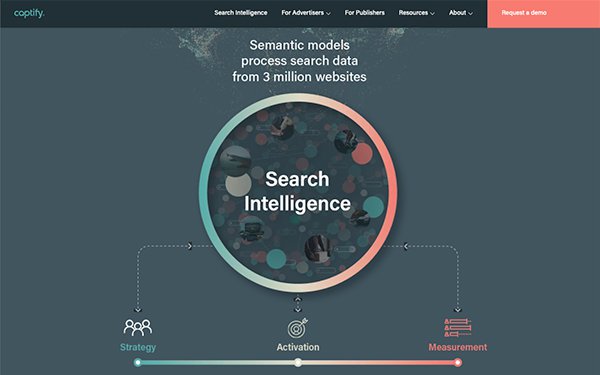
Another search intelligence company has been gobbled up --
this time by Verve Group, the ad-technology company based in Stockholm.
Verve will pay a total of €25.6 million for Captify Technologies in the deal, announced Wednesday.
The transaction is structured with a EUR 16.2 million cash consideration within six weeks of closing, and an additional deferred cash consideration of EUR 9.4 million 18 months after closing.
Captify has been consolidated into Verve Group financials as of September 16, 2025.
Remco Westermann, CEO of Verve Group SE, stated in the release that the deal delivers on the company's
strategic roadmap.
"We are strengthening our demand side, accelerating our expansion into the UK market and gaining a strong sales team, which will benefit the entire Group," he
stated.
Captify, which Verve disclosed had been undergoing a restructuring earlier this year, is expected to contribute revenue of about EUR 41 million on a full-year 2025 estimate
normalized proforma basis with an expected earnings before interest, depreciation, and amortization (EBITDA) of about EUR 5 million including significant post-deal synergies.
The
financial effects of these measures are believed to have been normalized in order to present a realistic annual impact on the financial figures and increase comparability.
advertisement
advertisement
Captify’s
technology solutions will enhance the data capabilities of Verve’s audience intelligence platform, Helix. Its team will integrate into Verve’s commercial brand and agency, technology and
product teams.
Mike Welch will step down from his role as chief executive officer of Captify and assume the role of a strategic advisor.
The addition of Captify's extensive search
data assets is expected to integrate with Verve’s existing technology. Its more than 30 employees and clients, which includes top-tier advertising agencies and half of the global top 100
advertisers, will support Verve's expansion goals.
Verve earlier this week announced its acquisition of German coupon provider Acardo for €24.5 million. That deal is expected to close in
October.
Among all the companies Verve has recently acquired, Captify is known in the U.S. mostly for its search data and expertise in generative artificial intelligence
(GAI).
Captify, headquartered in London, focused on real-time, cookieless search data and providing insights to advertisers and publishers. It processed and analyzed the search
behavior of up to 1 billion daily searches and aggregated about 400 billion active data points per day on 3 million websites to understand consumer intent, interest, and behavior that allowed for
precise targeting.
The company, from its data, developed a deep understanding of consumer interests, motivations, and intentions in real time, allowing for precise targeting and better
campaign measurement without the use of third-party cookies.
The combination of the Captify and Verve brands, as well as the agency sales teams, substantial synergies will be generated as
early as this year, company executives expect.
Verve also has been focused on consumer privacy and building trust. Today, it released a report to MediaPost that examines how publishers build
trust with consumers. Verve surveyed 4,000 mobile users across the U.S. and U.K. about the factors shaping consumers willingness to share data, how data is valued, the impact of personalization, and
how attitudes have changed over time.
The survey also explored specific levers for trust and the value exchange with regard to different app categories, devices, and platforms. It was
conducted by Censuswide on behalf of Verve between August 13 and August 19, 2025.
Globally, consumers spend 3:48 hours each day on mobile devices, and data privacy concerns continue to rise
across all categories Verve measured, yet consumers remain open to sharing data with publishers, according to the report.
From 2024 to 2025, consumers pulled back on sharing highly
identifying information like names and contact details, while showing more openness to sharing demographic and contextual information like region, health data, and personal characteristics.
Of
those who shared an opinion, three in four consumers now say they are more willing to watch ads in exchange for free content than they were two years ago. That’s up from two in three in the last
12 months.
One important point recognized in the findings is that consumers are most willing to share data when they understand how it is used and feel in control of it. Transparency and
user choice directly determine how much and what kind of data people are willing to provide.
The full version of the In-app User Privacy Report is available to DMEXCO attendees who scan at the
booth. Only the exec summary is widely available today.